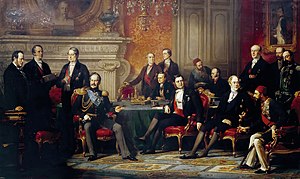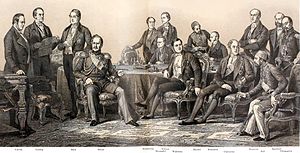
The Crimean War was fought from October 1853 to February 1856 between the Russian Empire and an ultimately victorious alliance of the Ottoman Empire, France, the United Kingdom, and Sardinia-Piedmont.
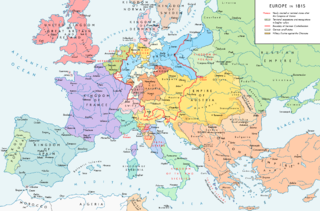
The Concert of Europe was a general agreement among the great powers of 19th-century Europe to maintain the European balance of power, political boundaries, and spheres of influence. Never a perfect unity and subject to disputes and jockeying for position and influence, the Concert was an extended period of relative peace and stability in Europe following the Wars of the French Revolution and the Napoleonic Wars which had consumed the continent since the 1790s. There is considerable scholarly dispute over the exact nature and duration of the Concert. Some scholars argue that it fell apart nearly as soon as it began in the 1820s when the great powers disagreed over the handling of liberal revolts in Italy, while others argue that it lasted until the outbreak of World War I and others for points in between. For those arguing for a longer duration, there is generally agreement that the period after the Revolutions of 1848 and the Crimean War (1853–1856) represented a different phase with different dynamics than the earlier period.

The Treaty of Berlin was signed on 13 July 1878. In the aftermath of the Russian victory against the Ottoman Empire in the Russo-Turkish War of 1877–1878, the major powers restructured the map of the Balkan region. They reversed some of the extreme gains claimed by Russia in the preliminary Treaty of San Stefano, but the Ottomans lost their major holdings in Europe. It was one of three major peace agreements in the period after the 1815 Congress of Vienna. It was the final act of the Congress of Berlin and included Great Britain and Ireland, Austria-Hungary, France, Germany, Italy, Russia and the Ottoman Empire. Chancellor of Germany Otto von Bismarck was the chairman and dominant personality.

The Holy Alliance, also called the Grand Alliance, was a coalition linking the monarchist great powers of Austria, Prussia, and Russia, which was created after the final defeat of Napoleon at the behest of Emperor (Tsar) Alexander I of Russia and signed in Paris on 26 September 1815.
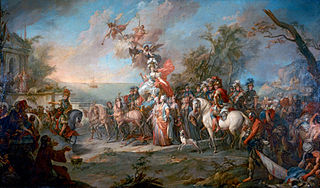
The Russo-Turkish War of 1768–1774 was a major armed conflict that saw Russian arms largely victorious against the Ottoman Empire. Russia's victory brought the Yedisan between the rivers Bug and Dnieper, and Crimea into the Russian sphere of influence. Through a series of victories accrued by the Russian Empire led to substantial territorial conquests, including direct conquest over much of the Pontic–Caspian steppe, less Ottoman territory was directly annexed than might otherwise be expected due to a complex struggle within the European diplomatic system to maintain a balance of power that was acceptable to other European states and avoided direct Russian hegemony over Eastern Europe.

The Treaty of Sèvres was a 1920 treaty signed between the Allies of World War I and the Ottoman Empire. The treaty ceded large parts of Ottoman territory to France, the United Kingdom, Greece and Italy, as well as creating large occupation zones within the Ottoman Empire. It was one of a series of treaties that the Central Powers signed with the Allied Powers after their defeat in World War I. Hostilities had already ended with the Armistice of Mudros.
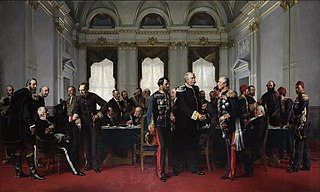
The Congress of Berlin was a diplomatic conference to reorganise the states in the Balkan Peninsula after the Russo-Turkish War (1877–1878), which had been won by Russia against the Ottoman Empire. Represented at the meeting were Europe's then six great powers: Russia, Great Britain, France, Austria-Hungary, Italy, and Germany; the Ottomans; and four Balkan states: Greece, Serbia, Romania and Montenegro. The congress concluded with the signing of the Treaty of Berlin, replacing the preliminary Treaty of San Stefano which had been signed three months earlier.

The 1878 Preliminary Treaty of San Stefano was a treaty between the Russian and Ottoman empires at the conclusion of the Russo-Turkish War of 1877–1878. It was signed at San Stefano, then a village west of Constantinople, on 3 March [O.S. 19 February] 1878 by Count Nicholas Pavlovich Ignatiev and Aleksandr Nelidov on behalf of the Russian Empire and by Foreign Minister Saffet Pasha and Ambassador to Germany Sadullah Bey on behalf of the Ottoman Empire.

The Paris Declaration respecting Maritime Law of 16 April 1856 was an international multilateral treaty agreed to by the warring parties in the Crimean War gathered at the Congress at Paris after the peace treaty of Paris had been signed in March 1856. As an important juridical novelty in international law the treaty for the first time created the possibility for nations that were not involved in the establishment of the agreement and did not sign, to become a party by acceding the declaration afterwards. So did altogether 55 nations, which otherwise would have been impossible in such a short period. This represented a large step in the globalisation of international law.
In diplomatic history, the Eastern question was the issue of the political and economic instability in the Ottoman Empire from the late 18th to early 20th centuries and the subsequent strategic competition and political considerations of the European great powers in light of this. Characterized as the "sick man of Europe", the relative weakening of the empire's military strength in the second half of the eighteenth century threatened to undermine the fragile balance of power system largely shaped by the Concert of Europe. The Eastern question encompassed myriad interrelated elements: Ottoman military defeats, Ottoman institutional insolvency, the ongoing Ottoman political and economic modernization programme, the rise of ethno-religious nationalism in its provinces, and Great Power rivalries. In an attempt to triangulate between these various concerns, the historian Leslie Rogne Schumacher has proposed the following definition of the Eastern Question:
The "Eastern Question" refers to the events and the complex set of dynamics related to Europe's experience of and stake in the decline in political, military and economic power and regional significance of the Ottoman Empire from the latter half of the eighteenth century to the formation of modern Turkey in 1923.

The Danubian Principalities was a conventional name given to the Principalities of Moldavia and Wallachia, which emerged in the early 14th century. The term was coined in the Habsburg monarchy after the Treaty of Küçük Kaynarca (1774) in order to designate an area on the lower Danube with a common geopolitical situation. The term was largely used then by foreign political circles and public opinion until the union of the two principalities in 1859. Alongside Transylvania, the United Principalities of Moldavia and Wallachia became the basis for the Kingdom of Romania, and by extension the modern nation-state of Romania.

The Congress of Paris is the name for a series of diplomatic meetings held in 1856 in Paris, France, to negotiate peace between the warring powers in the Crimean War that had started almost three years earlier.

Russo-Turkish wars or Russo-Ottoman wars were a series of twelve wars fought between the Russian Empire and the Ottoman Empire between the 16th and 20th centuries. It was one of the longest series of military conflicts in European history. Except for the war of 1710–11, as well as the Crimean War which is often treated as a separate event, the conflicts ended disastrously for the Ottoman Empire, which was undergoing a long period of stagnation and decline; conversely, they showcased the ascendancy of Russia as a European power after the modernization efforts of Peter the Great in the early 18th century.

The foreign relations of the Ottoman Empire were characterized by competition with the Persian Empire to the east, Russia to the north, and Austria to the west. The control over European minorities began to collapse after 1800, with Greece being the first to break free, followed by Serbia. Egypt was lost in 1798–1805. In the early 20th century Austria-Hungary annexed Bosnia and Herzegovina, the Bulgarian Declaration of Independence soon followed. The Ottomans lost nearly all their European territory in the First Balkan War (1912–1913). The Ottoman Empire allied itself with the Central Powers in the World War I, and was defeated. During the war, the British successfully mobilized Arab nationalism, and the Ottoman Empire thereby lost its Arab possessions, and itself soon collapsed in the early 1920s.

The Constantinople Agreement was a secret exchange of diplomatic correspondence between members of the Triple Entente from 4 March to 10 April 1915 during World War I. France and Great Britain promised to give Constantinople and the Dardanelles, at the time part of the Ottoman Empire, to the Russian Empire in the event of victory. Britain and France put forward their own claims, to an increased sphere of influence in Persia for Britain, and to the annexation of Syria and Cilicia for France, all sides also agreeing that the governance of the Holy Places and Arabia would be under independent Muslim rule. The Greek government was neutral, but in 1915 it negotiated with the Allies, offering soldiers and especially a geographical launching point for attacks on the Turkish Straits. Greece itself wanted control of Constantinople. Russia vetoed the Greek proposal, because its own main war goal was to control the Straits, and take control of Constantinople.
The territorial evolution of the Ottoman Empire spans seven centuries.

The United Principalities of Moldavia and Wallachia, commonly called United Principalities or Wallachia and Moldavia, was the personal union of the Principality of Moldavia and the Principality of Wallachia. The union was formed 5 February [O.S. 24 January] 1859 when Alexandru Ioan Cuza was elected as the Domnitor of both principalities. Their separate autonomous vassalage in the Ottoman Empire continued with the unification of both principalities. On 3 February [O.S. 22 January] 1862, Moldavia and Wallachia formally united to create the Romanian United Principalities, the core of the Romanian nation state.

The Danube River has been a trade waterway for centuries, but with the rise of international borders and the jealousies of national states, commerce and shipping has often been hampered for reasons of conflict and parochialism rather than cooperation between various powers in control of parts of the river. In addition, natural features of the river, most notably the sanding of the delta, has often hampered international trade. For these reasons, diplomats over the decades have worked to internationalize the Danube River in an attempt to allow commerce to flow as smoothly as possible.
The Commissions of the Danube River were authorized by the Treaty of Paris (1856) after the close of the Crimean War. One of these international commissions, the most successful, was the European Commission of the Danube, or, in French, Commission Européenne du Danube, the CED, which had authority over the three mouths of the river — the Chilia in the north, the Sulina in the middle, and the St. George in the south and which was originally designed to last for only two years. Instead, it lasted eighty-two years. A separate commission, the International Danube Commission, or IDC, was authorized to control commerce and improvements upriver beyond the Danube Delta and was supposed to be permanent, but it was not formally organized until after 1918.
